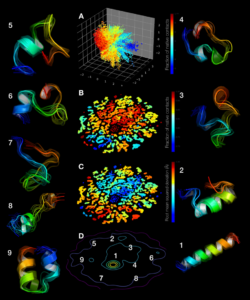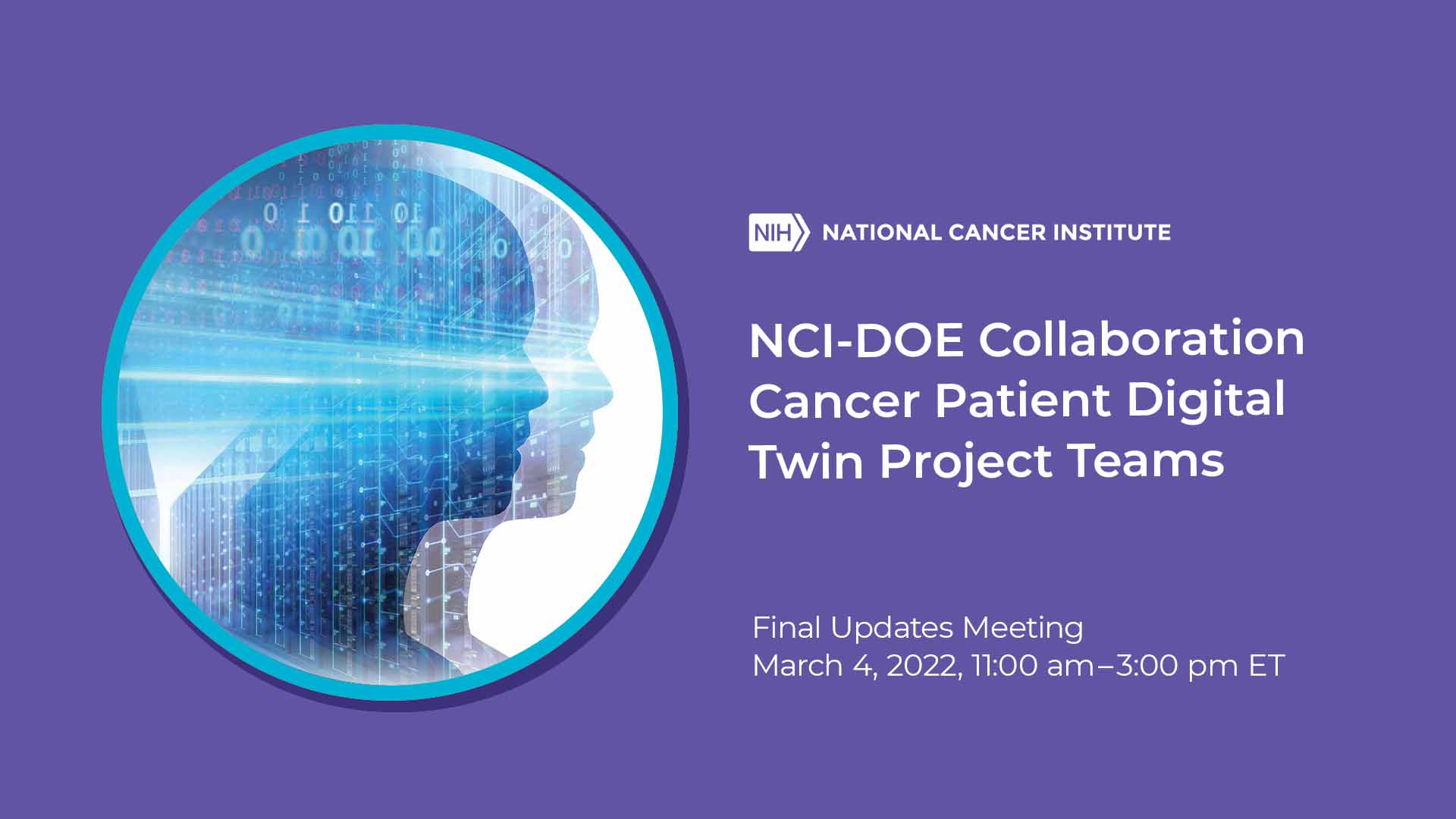NASEM’s report on Digital Twins is now available!
“Foundational Research Gaps & Future Directions for Digital Twins,” published by the National Academies of Sciences, Engineering, and Medicine (NASEM) identifies cross-sector challenges and recommendations to support this potentially transformative approach for biomedical research. Priorities include development of multi-agency collaborations with industry to advance the mathematical, statistical, and computational…
CloseRequest for Information: Calling all Researchers and Healthcare Community Contributors
NEW NCI Childhood Cancer Data Initiative (CCDI) Request for Information (RFI) on Electronic Health Record (EHR) data! Responses due using the submission webform by February 29, 2024. NCI’s CCDI invites participation from all stakeholders across the cancer research and health care community including vendors and developers in understanding information on existing capabilities for automated EHR…
CloseCancer Patient Digital Twin: News and Events
The NCI-DOE Collaboration and the ECICC community help to seed new areas of collaboration, such as advancing the development of a cancer patient digital twin. In July 2020, we held a 5-day virtual Ideas Lab, Toward Building a Cancer Patient “Digital Twin" to develop innovative cross-disciplinary collaborations and shape the future of predictive modeling across scales from biology to clinical care.
Selected from more than 130 applicants, 30 scientists from various career stages participated in the workshop and created new, collaborative research projects with guidance from multidisciplinary mentors. In late 2020, five project teams were selected to receive seed funding—made possible by DOE and NCI through Frederick National Laboratory for Cancer Research. Three of those teams were also invited to apply for additional DOE funding.
On March 4, 2022, principal investigators from the cancer patient digital twin project teams reported on their project results, challenges, and future work. Watch their presentations.
Related publications, events and initiatives are listed below.
Why a Digital Twin for Cancer and Why Now?
Today, cancer care teams offer patients a limited personalized view of their health trajectories, particularly when faced with varying treatment options. In the future, a patient’s digital twin (aka, avatar or virtual patient) could be used as a holistic in silico model for cancer research, pre-clinical development, clinical trials, and in other clinical settings to guide more effective and personalized treatment choices.
Creating digital twin technology stands as a grand challenge for the convergence of advanced computing technologies and oncology. It involves bridging spatiotemporal scales as never before—from the molecular, cellular, and tissue levels to the individual, population, and environmental levels. At each scale, agents interact with each other, and it will be necessary to identify the multitude of variables—many not currently captured systematically—that allow scales to be bridged and connected.
Advancing digital twin technology will benefit from dynamic, large-scale, multidisciplinary collaboration and is a major opportunity for co-design efforts integrating cancer research with artificial intelligence and advanced computing technologies.
Publications
Exploring approaches for predictive cancer patient digital twins: Opportunities for collaboration and innovation, Frontiers in Digital Health*
Impact of genetic dynamics and single-cell heterogeneity on development of nonstandard personalized medicine strategies for cancer, Proceedings of the National Academy of Sciences*
Tracing and forecasting metabolic indices of cancer patients using patient-specific deep learning models, Journal of Personalized Medicine*
A generalized evolutionary classifier (EC) for evolutionary guided precision medicine (EGPM), MedRxiv*
Envisioning the future of precision oncology trials, Nature Cancer*
Investigating key cell types and molecules dynamics in PyMT mice model of breast cancer through a mathematical model, PLoS Computational Biology*
A PDE model of breast tumor progression in MMTV-PyMT mice, Journal of Personalized Medicine*
A mathematical model of breast tumor progression based on immune infiltration, Journal of Personalized Medicine*
Events
Upcoming Meetings and Conferences
Sixth ISC Workshop on HPC Applications in Precision Medicine (HAPM23): https://ncihub.cancer.gov/groups/hapm/hapm23 (May 25, 2023, Hamburg, Germany)
Past Meetings and Conferences
Opportunities and Challenges for Digital Twins in Biomedical Sciences - A Workshop. The National Academies of Sciences, Engineering, and Medicine held a workshop on the use of digital twins for biomedical research on Monday, January 30, 2023 from 10 am to 4:30 pm ET. This event was one of three input-gathering workshops organized as part of a larger National Academies’ study on research gaps and future directions for digital twins. Learn more and sign up for updates on the study website.
Eighth Computational Approaches for Cancer Workshop (CAFCW22) held in conjunction with Supercomputing (SC22): https://ncihub.org/groups/cafcw/cafcw22, (November 13, 2022, Dallas, TX).
American Society for Radiation Oncology (ASTRO) Annual Meeting - AI and EI: Caring for Patients in a Wireless World: "Digital Twins for Radiation Oncology: Concepts, Methods and Applications," (October 23-26, 2022, San Antonio, TX).
International Conference on Intelligent Biology and Medicine: "Digital Twins for Predictive Health: Vision and Roadmap," (August 7, 2022, Philadelphia, PA).
American Association of Physicists in Medicine (AAPM), 64th Annual Meeting: "Digital Twins of Cancer Patients: A New Perspective to Support Clinical Decisions," (July 10-14, 2022, Washington, DC).
IEEE International Symposium on Biomedical Imaging (ISBI) 2022: “Spatially preserving flattening for location-specific recognition of findings.
Fourth ISC Workshop on HPC Applications in Precision Medicine (HAPM21) (https://ncihub.org/groups/hapm21
Seventh Computational Approaches for Cancer Workshop (CAFCW21) held in conjunction with Supercomputing (SC21): https://ncihub.org/groups/cafcw/cafcw21
Medical Image Computing and Computer-Assisted Intervention – MICCAI 2021: "Image-Derived Phenotype Extraction for Genetic Discovery via Unsupervised Deep Learning in CMR Images."
IEEE International Symposium on Biomedical Imaging (ISBI) 2021: "Modeling uncertainty in multimodal fusion for lung cancer survival analysis."
IEEE International Symposium on Biomedical Imaging (ISBI) 2021: "Multimodal fusion using sparse CCA for breast cancer survival prediction," (Poster)
ECICC Community: Toward Building a Cancer Patient "Digital Twin" Ideas Lab
ECICC Community: A Preview of the Ideas Lab (MicroLab)
IEEE International Symposium on Biomedical Imaging (ISBI) 2020: "Multimodal fusion of imaging and genomics for lung cancer recurrence prediction."
Related Initiatives
The National Academies of Sciences, Engineering and Medicine (NASEM) is undertaking an 18-month study on digital twin, funded by several federal agencies, including The National Cancer Institute and the Department of Energy. NASEM will host a biomedical workshop as part of its research on digital twin.

